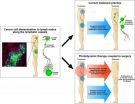(Press-News.org) COLUMBUS, Ohio – One factor, little-known by borrowers, can play a large role in whether banks are willing to renegotiate mortgages with homeowners who are struggling to meet payments.
Unfortunately, it is a factor that homeowners have no control over.
Researchers found that mortgages owned by lenders were 26 to 36 percent more likely to be renegotiated than very similar mortgages that the original lenders sold to other companies, which turned them into securities.
"Homeowners don't have a say in whether their bank sells their mortgage or not, but that can have a significant impact on whether their loan is re-negotiated," said Itzhak Ben-David, co-author of the study and assistant professor of finance at Ohio State University's Fisher College of Business.
"From the homeowners' perspective, whether their mortgage is traded among investors is completely outside of their control."
Other co-authors of the study are Sumit Agarwal, Gene Amromin, and Douglas Evanoff from the Chicago Federal Reserve Bank, and Souphala Chomsisengphet from the Office of the Comptroller of the Currency.
The research was accepted to the Journal of Financial Economics and will be published in a future print edition.
When people get mortgages from lenders such as banks, these lenders can keep the mortgages themselves, or they can sell them to a company like Goldman Sachs, who bundles many thousands of mortgages together into one security offering. They then offer shares of this security to investors.
The lender you got the mortgage from may still "service" the loan – meaning it will collect your payments and deal with your paperwork – but it doesn't actually own your mortgage any more.
"You may not even know that your mortgage has been sold, but it could have real effects on you if you ever become delinquent in your payments," Ben-David said.
Other studies have looked at whether securitization of mortgages affects renegotiations, and have shown conflicting results. But these other studies did not have direct data on renegotiations between lenders and homeowners, so their results may not be as robust as this new study.
By contrast, Ben-David and his colleagues evaluated data on more than 34 million mortgages, making up about 64 percent of all U.S. residential mortgages. This unique dataset includes detailed information on mortgages from 19 different servicing companies owned by 10 large banks. These servicing entities have control over whether mortgages are renegotiated, regardless of their ultimate corporate ownership, Ben-David said.
The dataset comes from two federal agencies: the U.S. Office of the Comptroller of the Currency and the Office of Thrift Supervision.
The researchers focused their attention on the nearly 1.6 million mortgages that were "in trouble" – more than 60 days past due -- in 2008 and the first two quarters of 2009.
The data showed that, at least in 2008 and early 2009, the servicers were not taking quick action against delinquent homeowners, Ben-David said. Six months after the mortgages were listed "in trouble," nearly half had no action taken against them by their mortgage servicers.
Even after a year, servicers had taken no action against about one-quarter of all delinquent homeowners.
"Part of the reason may be that the whole system was congested," Ben-David said. "There were not enough lawyers to handle all of these delinquent loans. Or, perhaps some borrowers self-cured and became current."
About half of the in-trouble mortgages had been foreclosed or were in the foreclosure process after a year. The remaining one quarter was in some type of modification process, he said.
The most common type of modification was a reduction or freezing of the interest rate, results showed.
While only about a quarter of the troubled loans in the study underwent modification, the most striking result was how bank-held loans were 26 to 36 percent more likely to be renegotiated than comparable securitized mortgages.
"This is a very significant economic effect," Ben-David said.
The results were similar no matter the quality of the loan. In other words, borrowers with the best credit scores suffered as much as those with lower scores.
The researchers also looked at what happened to borrowers who did get modifications of their loans.
The results showed that borrowers whose loans were owned by banks actually got tougher terms – for example, they paid higher interest rates after modification than similar borrowers whose loans were in securities.
Still, bank-held loans had about a 9 percent lower default rate after modification than did similar securitized loans.
"That's likely due to the fact that servicers have better information about borrowers whose loans they own directly," Ben-David said.
"The bank knows these borrowers better, so even if they give less concessions they still have better outcomes. They know exactly how much they have to give."
But why are borrowers less likely to get loan modifications if their mortgages are held in securities?
Ben-David said it probably has to do with the added costs involved when the company that services the loan is different from the owner of the loan.
"There are coordination issues between the servicer and owner, as well as the fact that servicers may not have the financial incentive to renegotiate because they don't own the loan," he said.
On an individual level, there's not much one can do to improve your chances of getting a modification, since borrowers don't have control over whether their mortgage is securitized and can't even find out if it has been securitized, according to Ben-David.
From a policy perspective, the federal government had the right idea with its Home Affordable Modification Program, which was designed to help struggling homeowners, he said.
"In retrospect, we know HAMP has not worked well because it wasn't implemented properly. But the economic idea was sound – reduce the servicers' transaction costs so they have an incentive to modify loans," Ben-David said.
###
Contact: Itzhak Ben-David, (614) 292-7843; bendavid@fisher.osu.edu
Written by Jeff Grabmeier, (614) 292-8457; Grabmeier.1@osu.edu
1 factor can make mortgage modifications up to one-third more likely, study finds
2011-02-10
ELSE PRESS RELEASES FROM THIS DATE:
Behavioral problems linked to cortisol levels
2011-02-10
Montreal, February 9, 2011 – Cortisol, the so-called stress hormone, seems to behave in contradictory ways in children. Some youngsters with behavioral problems have abnormally high levels of cortisol, while others with identical problems have abnormally low levels. What's going on?
Researchers at Concordia University and the Centre for Research in Human Development may have resolved the cortisol paradox. In a groundbreaking study published in the journal Hormones and Behavior, they link cortisol levels not simply to behavior problems, but to the length of time individuals ...
Beyond Alzheimer's: Research explores hippocampal sclerosis
2011-02-10
LEXINGTON, Ky. (Feb. 9, 2011) - The population of aged persons worldwide is expanding rapidly, and it is becoming increasingly clear that there are many different diseases that affect the minds of these individuals. Researchers at the University of Kentucky are breaking new ground in the ongoing project of identifying and defining those diseases most likely to affect an aged population. Dr. Peter Nelson of the University of Kentucky Sanders-Brown Center on Aging is the lead author on a paper soon to be published in the journal BRAIN; the paper deals with the little-understood ...
Crocodile tears don't fool us all
2011-02-10
How easy is it to fake remorse? Not so easy if your audience knows what to look for. In the first investigation of the nature of true and false remorse, Leanne ten Brinke and colleagues, from the Centre for the Advancement of Psychology and Law (CAPSL), University of British Columbia and Memorial University of Newfoundland in Canada, show that those who fake remorse show a greater range of emotional expressions and swing from one emotion to another very quickly - a phenomenon referred to as emotional turbulence - as well as speak with more hesitation. These findings have ...
Personal well-being is linked to national satisfaction, especially when times are tough
2011-02-10
The country where you live can have a big impact on your life. A new study of people from 128 countries finds that the more satisfied people are with their country, the better they feel about their lives—especially people who have low incomes or live in relatively poor countries.
The study, published in the latest issue of Psychological Science, a journal of the Association for Psychological Science, is based on a Gallup World Poll that reached about 1,000 people in each of 128 countries, obtaining a total of more than 130,000 responses. People were asked a series of ...
Cocaine production increases destruction of Colombia's rainforests
2011-02-10
Cultivating coca bushes, the source of cocaine, is speeding up destruction of rainforests in Colombia and threatening the region's "hotspots" of plant and animal diversity, scientists are reporting in a new study. The findings, which they say underscore the need for establishing larger protected areas to help preserve biodiversity, appear in ACS' journal Environmental Science & Technology.
Liliana M. Dávalos and colleagues note that the pace of deforestation in Colombia has accelerated over the past 20 years, even as population growth has slowed and the economy has shifted ...
Greener process for key ingredient for everything from paint to diapers
2011-02-10
Scientists are reporting discovery of an environmentally friendly way to make a key industrial material — used in products ranging from paints to diapers — from a renewable raw material without touching the traditional pricey and increasingly scarce petroleum-based starting material. Their report on a new catalyst for making acrylic acid appears in ACS Catalysis, the newest in the American Chemical Society's suite of 39 peer-reviewed scientific journals.
Weijie Ji, Chak-Tong Au, and colleagues note that acrylic acid is essential for making paints, adhesives, textiles, ...
Toward a fast, simple test for detecting cholera rampaging in 40 countries
2011-02-10
With cholera on the rampage in Haiti and almost 40 other countries, scientists are reporting the development of a key advance that could provide a fast, simple test to detect the toxin that causes the disease. The report appears in ACS' journal Bioconjugate Chemistry. Cholera affects more than 200,000 people annually, mainly in developing countries, and causes about 5,000 deaths. Many involve infants, children, and the elderly.
J. Manuel Perez and colleagues note that cholera is an intestinal infection from food or water contaminated with the bacterium Vibrio cholerae. ...
A green way to cap an old landfill
2011-02-10
This release is available in Spanish.
U.S. Department of Agriculture (USDA) scientist Pat Millner and safety manager David Prevar have worked with the U.S. Environmental Protection Agency (EPA) and private consultants to design and conduct a pilot study for an alternative way to cap landfills.
Millner is a microbiologist at the 6,615-acre Henry A. Wallace Beltsville Agricultural Research Center (BARC) operated in Beltsville, Md., by the Agricultural Research Service (ARS), the chief intramural scientific research agency of USDA.
Prevar oversees safety and health issues ...
Photodynamic therapy against cancer
2011-02-10
Tumor cells have several routes that enable them to move from the primary tumor to distant tissues, a process called metastasis. It is metastasis of the primary tumor that kills most cancer patients. One of the least studied routes of metastasis is the lymphatic system. Many tumors produce factors that promote the formation of new lymphatic vessels (lymphangiogenesis). The newly formed lymphatic vessels enable tumor cells to travel from the primary tumor to the regional lymph nodes from whence they can spread throughout the body.
Current treatment practice is to surgically ...
Challenges for biofuels: New life cycle assessment report from Energy Biosciences Institute
2011-02-10
A combination of rising costs, shrinking supplies, and concerns about global climate change are spurring the development of alternatives to the burning of fossil fuels to meet our transportation energy needs. Scientific studies have shown the most promising of possible alternatives to be liquid fuels derived from cellulosic biomass. These advanced new biofuels have the potential to be clean-burning, carbon-neutral and renewable. Some could also be delivered through existing pipelines and used in today's engines, replacing gasoline on a gallon-for-gallon basis with no loss ...


